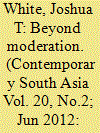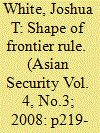| Srl | Item |
| 1 |
ID:
113241


|
|
|
|
|
| Publication |
2012.
|
| Summary/Abstract |
Concerned with a rising tide of religious radicalism within Pakistan, many observers have wondered why moderates do not speak out against militancy. This article explores that question, arguing that the term 'moderate' as used in Pakistan has conflicting meanings and is both more complicated and less useful as a tool of analysis than it once seemed. In particular, the inadequacy of extant definitions is best reflected in the reassertion of a radical Sunni Barelvi subculture and in the growing rift between some leading Islamist parties and the Pakistani Taliban. This article argues in conclusion that ideological factors are typically given undue weight in explaining why and when Pakistanis choose to 'speak out' against militancy and that a narrow, minimalist rendering of 'moderate' provides the most useful definition for those trying to understand the new fault lines emerging within Pakistani Islam.
|
|
|
|
|
|
|
|
|
|
|
|
|
|
|
|
| 2 |
ID:
170168


|
|
|
|
|
| Summary/Abstract |
The United States has sought over the last two decades to facilitate India’s rise as a means of balancing against China’s ambitions. Notwithstanding the rich literature that has emerged on Sino-Indian dynamics and the U.S.-India-China triad, there has been remarkably little examination of the ways in which the United States navigates its relationships with these two rising powers. This study poses a simple question: to what extent has the United States’ pursuit of its interests with India meant that it has accepted trade-offs with respect to its interests with China? Drawing on government documents, interviews with current and former U.S. officials, and an array of case studies between 2005 and early 2019, this study argues first that the U.S. bureaucracy has long been structured in such a way as to heavily compartment policy decision-making related to South Asia and East Asia, respectively, and to produce a pronounced but largely explicable structural bias toward East Asia; second, that relatively few policy matters have arisen since 2005 that have forced the United States to consider meaningful trade-offs between its India and China equities; and third, that new challenges may arise for Washington as its deals with an increasingly inter-connected Indo-Pacific region, and manages the bureaucratic and policy implications of its renewed emphasis on great power competition.
|
|
|
|
|
|
|
|
|
|
|
|
|
|
|
|
| 3 |
ID:
083820


|
|
|
|
|
| Publication |
2008.
|
| Summary/Abstract |
This essay examines British colonial debates about governance in India as a means of positing an analytical framework in which to address the current crises of governance in Pakistan's frontier. In light of the collapse of the antiquated system of tribal governance in the Federally Administered Tribal Areas (FATA), and the spread of insurgent Talibanization into the heart of the ethnically Pashtun settled areas, this analysis maps several possible transition paths for governance reform in both the tribal and settled regions, and argues for an incremental approach that minimizes risks to political stability
|
|
|
|
|
|
|
|
|
|
|
|
|
|
|
|